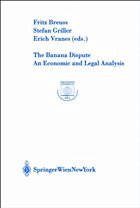Main description:
The 'Banana dispute' represents one of the central cases in international trade. It has led to several precedents on the international (WTO), EC and national level. It thus constitutes the mandatory starting point for any in-depth study of the WTO system and transatlantic trade relations. Moreover, this dispute casts new light on classic issues of European law, especially the relationship of EC, national law and state liability.
This treatise is the most comprehensive and easily accessible one published up to now. The study is supplemented by an economic analysis of the welfare effects of the EC banana import regime for the EC domestic market, and interdisciplinary conclusions for future amendments of the WTO enforcement system.
This book will be of equal interest to practitioners, academics and students of international economic relations.
Table of contents:
From the Table of Contents:
From Bananas I to the 2001 Bananas Settlement: A Factual and Procedural Analysis of the WTO Proceeding.- The Banana Dispute: Fundamental Issues under WTO Law.- Cross Retaliation under GATS and TRIPS - An Optimal Enforcement Device for Developing Countries?.- WTO Dispute Settlement in Practice - An Economic Assessment.- Introduction to the Problems of EU Fundamental Rights Protection, the Status of WTO Law within the EU, and Community Liability for Infringements of WTO Law.- European Human Rights Protection and the Contested Relationship of the ECJ and National Courts - Convergent Solutions under International, European and National Law?; Enforcement and Implementation of WTO Law in the European Union.- The ECJ’s Atlanta Judgment: Establishing a Principle of Non-Liability?.- Welfare Implications of the EU’s Common Organization of the Market in Bananas for EU Member States.- The Overall Perspective: Legal, Economic and Policy Conclusions
The 'Banana dispute' represents one of the central cases in international trade. It has led to several precedents on the international (WTO), EC and national level. It thus constitutes the mandatory starting point for any in-depth study of the WTO system and transatlantic trade relations. Moreover, this dispute casts new light on classic issues of European law, especially the relationship of EC, national law and state liability.
This treatise is the most comprehensive and easily accessible one published up to now. The study is supplemented by an economic analysis of the welfare effects of the EC banana import regime for the EC domestic market, and interdisciplinary conclusions for future amendments of the WTO enforcement system.
This book will be of equal interest to practitioners, academics and students of international economic relations.
Table of contents:
From the Table of Contents:
From Bananas I to the 2001 Bananas Settlement: A Factual and Procedural Analysis of the WTO Proceeding.- The Banana Dispute: Fundamental Issues under WTO Law.- Cross Retaliation under GATS and TRIPS - An Optimal Enforcement Device for Developing Countries?.- WTO Dispute Settlement in Practice - An Economic Assessment.- Introduction to the Problems of EU Fundamental Rights Protection, the Status of WTO Law within the EU, and Community Liability for Infringements of WTO Law.- European Human Rights Protection and the Contested Relationship of the ECJ and National Courts - Convergent Solutions under International, European and National Law?; Enforcement and Implementation of WTO Law in the European Union.- The ECJ’s Atlanta Judgment: Establishing a Principle of Non-Liability?.- Welfare Implications of the EU’s Common Organization of the Market in Bananas for EU Member States.- The Overall Perspective: Legal, Economic and Policy Conclusions
Perlentaucher-Notiz zur NZZ-Rezension
Vornehmlich an den Fachmann richtet sich nach Einschätzung von Rezensent Richard Senti diese Veröffentlichung des Wiener Forschungsinstituts über den Bananenstreit, der im Rahmen der Welthandelsorganisation (WTO) zwischen einigen mittelamerikanischen Staaten, Mexiko und den USA einerseits und einigen EU-Mitgliedländern andererseits ausgefochten wurde. Wie Senti berichtet, geht es den Autoren des Bandes darum, den Bananenstreit aufzuarbeiten und aus rechtlicher und ökonomischer Sicht zu analysieren. Auf eine "lehrbuchartige Einführung" in Streitschlichtungs-Recht und die außenhandelstheoretischen Grundlagen der Welthandelsordnung der WTO folge eine Analyse der Beziehungen zwischen WTO-Recht und EU-Gemeinschaftsrecht, die in der Aufforderung münde, die Frage der Rechtsverbindlichkeit des WTO-Rechts im EU-Gemeinschaftsrecht neu zu überdenken. Die skeptische Frage, ob es das Ziel der Handelspolitik sein dürfe, eine Regelung zu befürworten, die letztlich den Handel auf Kosten der Konsumenten begünstige, beschließe die ökonomischen Analysen der Autoren.
© Perlentaucher Medien GmbH
© Perlentaucher Medien GmbH

